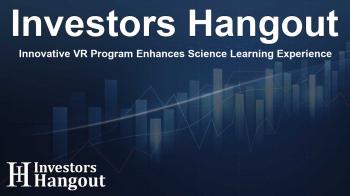Innovative VR Program Enhances Science Learning Experience

Transforming Science Education Through Virtual Reality
Recent studies emphasize the incredible potential of virtual reality (VR) in revolutionizing science education. Arizona State University has embarked on an ambitious initiative that demonstrates how immersive learning experiences can enhance educational outcomes, student satisfaction, and engagement.
Effectiveness of the Dreamscape Learn Program
A recent study revealed that over 4,000 students who participated in biology courses augmented by the Dreamscape Learn VR program experienced remarkable improvements. These enhancements were noted not just in their lab grades but also in their overall academic performance. The incorporation of story-driven VR learning environments facilitated a deeper connection to the subject matter, effectively engaging students and boosting retention in science-related fields.
Key Insights from the Study
The comprehensive study included rigorous analysis through pre- and post-class surveys, insightful interviews, and classroom observations, resulting in several key findings:
- Students across various demographics consistently achieved high marks, averaging grades from 90.8% to 94.1% on VR lab assignments.
- There was a noticeable boost in retention rates within STEM courses, with students more inclined to remain in their majors at least a year post-course.
- Students improved their grades significantly, with an average enhancement of a quarter letter grade as they transitioned from earlier biology courses to more advanced classes.
- In advanced biology majors, students recorded a similar upward trend, scoring higher in 300-level courses.
- The satisfaction rating of the VR experience was exceptionally high, with students reportedly enjoying it at a maximum rating of 5 out of 5 for immersive engagement.
Student Perspectives
As Annie Hale, the study's lead and executive director at EdPlus, pointed out, the emotionally engaging narratives embedded in the Dreamscape Learn program enable students to visualize and embody the role of scientists. This creative approach not only enriches learning but also instills a sense of ownership and identity in participants.
Broader Implications for STEM Education
Arizona State University's commitment to advancing STEM education is commendable. Their initiative, dubbed NeoBio, has garnered national attention and recently achieved recognition at prestigious awards, celebrating innovation in education. By collaborating with K-12 schools and universities, ASU is broadening its reach, having already engaged over 20,000 additional students beyond the 25,000 who have already experienced the VR program.
Future Plans for Expansion
The success of the Dreamscape Learn program paves the way for further expansion into other academic disciplines. Upcoming VR experiences will soon incorporate courses across various fields, including chemistry, sustainability, space exploration, engineering, business, and the humanities. This strategic growth reflects ASU's vision to harness the power of technology to enrich education extensively.
Concluding Remarks
As the use of virtual reality continues to evolve, its integration into academic settings offers promising solutions to some of the challenges faced in contemporary education. Institutions like Arizona State University are setting a new standard in how science and other subjects can be taught effectively. This approach not only elevates the learning experience but also cultivates the future workforce equipped with the necessary skills and knowledge to thrive in a rapidly changing world.
Frequently Asked Questions
1. What is the Dreamscape Learn program?
The Dreamscape Learn program utilizes story-driven virtual reality experiences to teach biology and enhance student engagement and performance.
2. How many students participated in the study?
Over 4,000 students were part of the study, benefiting from enhanced biology courses using the VR program.
3. What were the academic improvements observed?
Students demonstrated significant academic performance increases, averaging a quarter letter grade improvement in their courses.
4. How does the program affect STEM retention rates?
The program has proven to improve retention in STEM majors, encouraging students to stay in their fields for over a year after taking the course.
5. What subjects will the VR experience expand to in the future?
The VR program is set to expand into disciplines such as chemistry, space exploration, engineering, business, and humanities.
About The Author
Contact Kelly Martin privately here. Or send an email with ATTN: Kelly Martin as the subject to contact@investorshangout.com.
About Investors Hangout
Investors Hangout is a leading online stock forum for financial discussion and learning, offering a wide range of free tools and resources. It draws in traders of all levels, who exchange market knowledge, investigate trading tactics, and keep an eye on industry developments in real time. Featuring financial articles, stock message boards, quotes, charts, company profiles, and live news updates. Through cooperative learning and a wealth of informational resources, it helps users from novices creating their first portfolios to experts honing their techniques. Join Investors Hangout today: https://investorshangout.com/
The content of this article is based on factual, publicly available information and does not represent legal, financial, or investment advice. Investors Hangout does not offer financial advice, and the author is not a licensed financial advisor. Consult a qualified advisor before making any financial or investment decisions based on this article. This article should not be considered advice to purchase, sell, or hold any securities or other investments. If any of the material provided here is inaccurate, please contact us for corrections.

